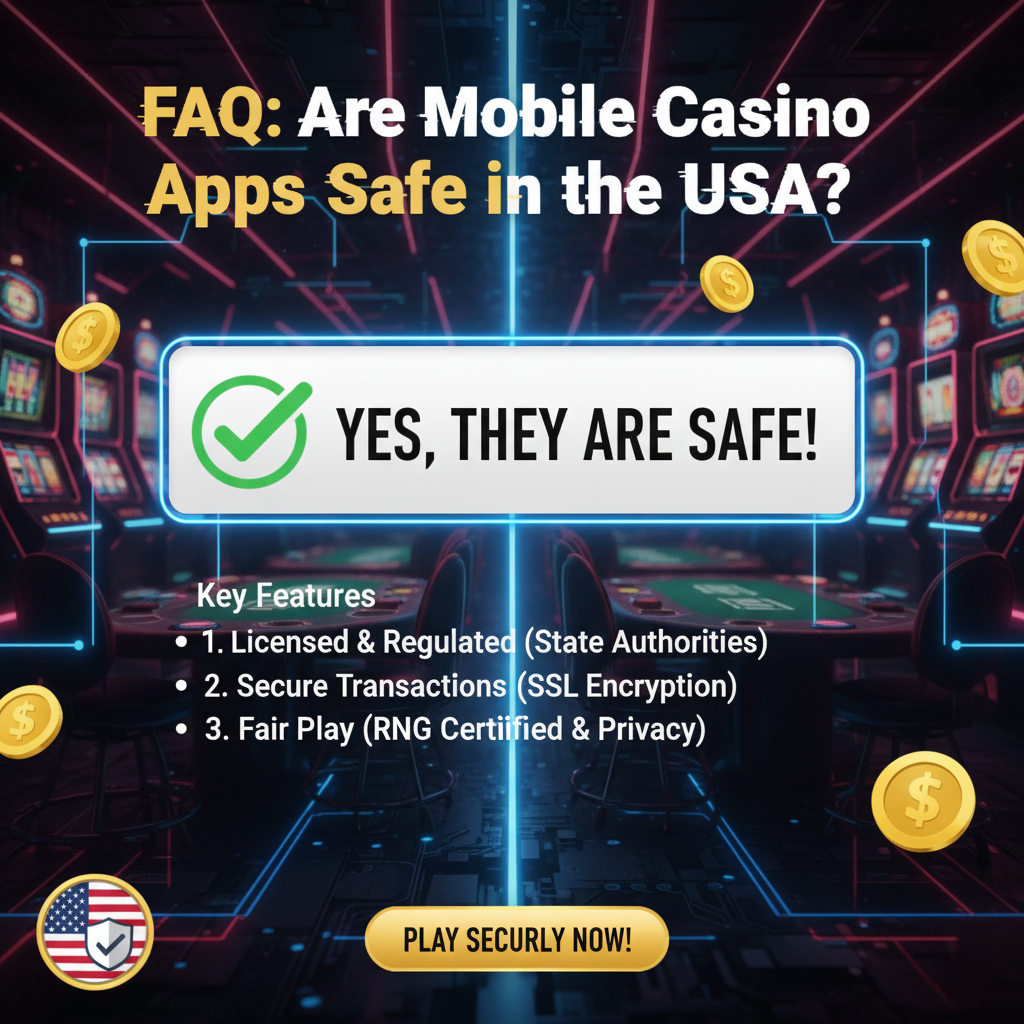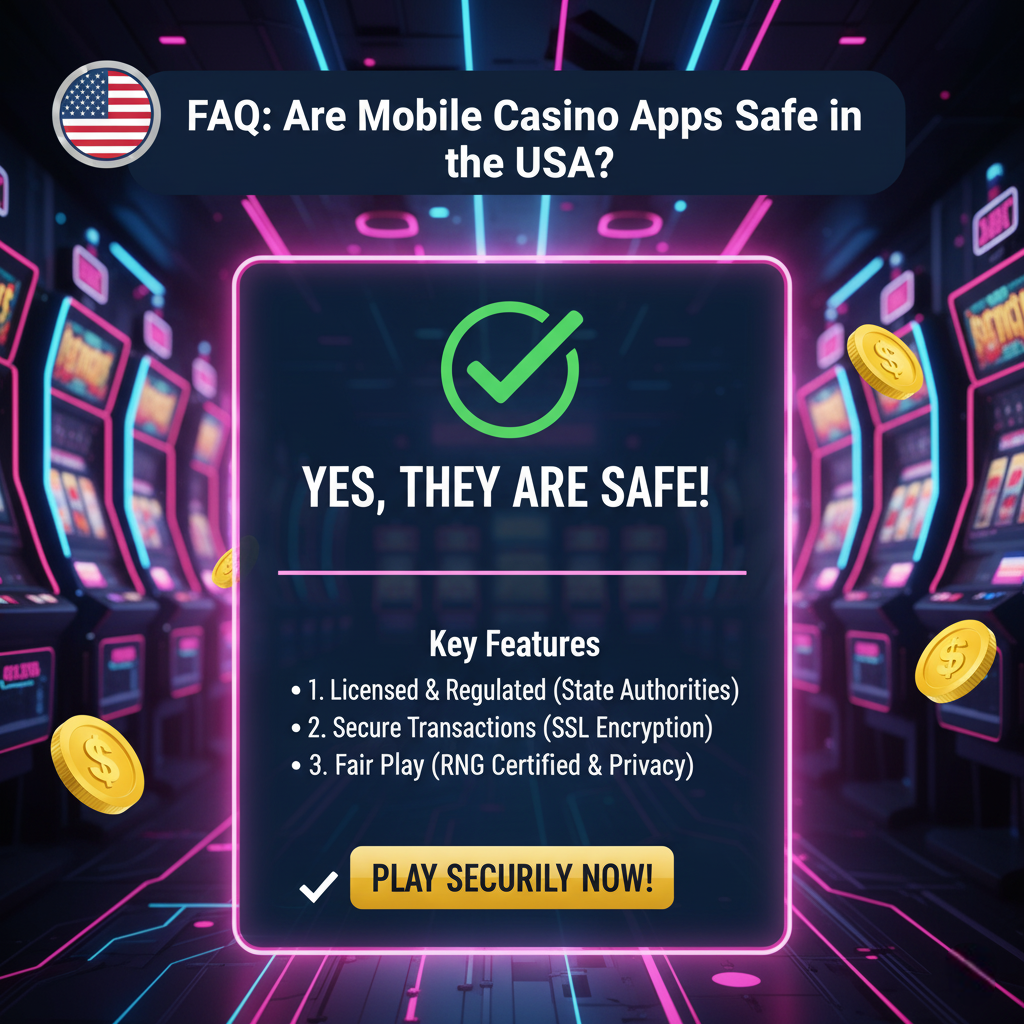 Safety is the number one concern for anyone considering real money casino apps, given the high stakes involving personal information, bank details, and actual cash. While fears of fraud and data breaches are understandable, licensed and regulated mobile casino apps operating in legal US states are genuinely safe. These legitimate platforms are secured by bank-level encryption and operate under strict government oversight and rigorous testing. The real danger lies in using fake apps, offshore operators, or unlicensed platforms, making it essential to know what red flags signal a danger.
Safety is the number one concern for anyone considering real money casino apps, given the high stakes involving personal information, bank details, and actual cash. While fears of fraud and data breaches are understandable, licensed and regulated mobile casino apps operating in legal US states are genuinely safe. These legitimate platforms are secured by bank-level encryption and operate under strict government oversight and rigorous testing. The real danger lies in using fake apps, offshore operators, or unlicensed platforms, making it essential to know what red flags signal a danger.
How Mobile Casino Apps Ensure Safety
Understanding mobile casino app protection requires recognizing the multiple layers of security legally required for licensed platforms. Regulated operators in US states must prove safety through independent audits, technological safeguards, and transparent business practices, meeting stringent consumer protection standards.
This infrastructure extends beyond passwords, ensuring your data travels through encrypted channels, gameplay is monitored for fairness, and funds are protected by state-mandated segregation. These robust features are not optional, but mandatory requirements for maintaining a gaming license, forming the three core pillars of app safety.
Every legitimate mobile casino app operating in the USA must hold a license from a state gaming authority, which is earned through months of rigorous background checks, financial scrutiny, and continuous technical monitoring. Although regulatory bodies differ by state, their collective purpose remains the same: protecting players by setting strict, mandatory requirements on everything from withdrawal speeds to odds transparency.
Offshore casino apps that target US players but operate without state licenses bypass all these protections. They might display fake license seals or claim regulation from jurisdictions with minimal oversight. The difference matters enormously. A licensed operator in New Jersey faces massive fines and license revocation for any security failure. An offshore app operating illegally faces no real consequences and has no incentive to protect your data or pay your winnings.
Encryption and Secure Payment Systems
When you enter your credit card details or bank account information into a mobile casino app, that data needs to travel from your phone to the casino’s servers without anyone intercepting it. Licensed apps use SSL encryption, the same technology banks use for online transactions. This encryption scrambles your data into unreadable code that only the intended recipient can decode. You can verify this protection by looking for HTTPS in the app’s web version or checking for security certificates in the app’s documentation.
Payment processing adds another security layer. Regulated mobile casinos don’t just accept any payment method. They partner with established payment processors like PayPal, Play Plus, or licensed payment gateways that have their own security standards. These processors never share your full credit card number with the casino itself. Instead, they use tokenization, replacing your actual card number with a unique identifier that’s useless to hackers even if intercepted.
Random Number Generators and Fair Play Audits
To counter the fear that software-based mobile games might be rigged, every outcome in a licensed casino app is determined by a certified Random Number Generator (RNG). These complex algorithms are verified by independent testing laboratories like GLI or eCOGRA, which ensure that game outcomes are truly unpredictable and that the stated odds (like a 96% RTP) are accurately met over millions of spins.
State gaming regulators conduct ongoing audits to ensure RNG systems remain untampered and fair, as any game modification requires re-certification and regulators continuously compare current builds against approved versions. This combination of certified RNG technology, independent testing, and strict regulatory oversight creates a system where rigging games is nearly impossible for licensed operators, as the risk of losing their license and reputation far outweighs any potential gain.
Risks and Red Flags to Watch Out For
While licensed mobile casino apps offer solid protection, the mobile gambling landscape includes plenty of dangers for players who aren’t careful. The biggest threats don’t come from regulated operators, they come from fake apps designed to look legitimate, offshore platforms that operate in legal gray zones, and outright scams targeting players who don’t know what to look for. Recognizing these red flags can save you from losing money, having your identity stolen, or installing malware on your device.
Downloading from Unofficial Sources
The Apple App Store and Google Play Store have security vetting processes that block most malicious apps, but scammers have found workarounds. The most common trick involves convincing players to download Android APK files from third-party websites instead of official app stores. These APK files bypass Google’s security checks entirely, meaning they can contain anything from spyware to cryptocurrency miners that drain your battery while enriching the scammer.
❌ Dangerous Download Sources
- Third-party APK websites
- Casino sites offering direct downloads
- Links sent via email or text
- Social media promoted APKs
✅ Safe Download Sources
- Apple App Store only
- Google Play Store only
- Official casino website links to stores
- State gaming authority approved lists
Some fake casino apps use names almost identical to legitimate operators, changing just one letter or adding extra words. Players searching for a known casino might download what looks like the right app but is actually a clone designed to steal login credentials. Always verify the developer name matches the actual casino company before downloading.
Apps with Hidden Malware or Spyware
Malicious casino apps don’t always announce themselves with obvious problems. Some work exactly like real casinos at first, letting you play games and even make small withdrawals to build trust. Meanwhile, they’re secretly harvesting data from your phone, tracking your other app usage, or logging your keystrokes to capture passwords for banking apps. By the time you notice something wrong, significant damage may already be done.
💡 Warning Signs of Malicious Apps
Watch for these red flags after installing a casino app:
- Battery drains much faster than normal
- Phone runs hot even when app is closed
- Excessive permission requests unrelated to gambling
- Pop-up ads appearing outside the app
- Unknown apps installing themselves
Fake Bonuses and Phishing Attempts
Scammers use the appeal of casino bonuses to trick players into providing sensitive information. You might receive an email or text claiming you’ve won a special bonus from a casino you’ve never joined, with a link to claim it. That link leads to a fake login page designed to capture your email and password, which criminals then use to access your real casino accounts or other online services where you reused the same password.
Legitimate regulated casinos will never ask you to verify your account by clicking an email link and entering your full banking information. They won’t send unsolicited texts about bonuses you didn’t request. And they definitely won’t demand immediate action with threatening language about your account being closed. These high-pressure tactics are classic phishing red flags.
State Laws and App Store Policies
The legal framework surrounding mobile casino apps in the USA creates an important safety layer, though it can be confusing because gambling laws vary dramatically by state. Understanding which states allow regulated mobile gambling and how app store policies work helps you know when you’re operating within protected legal boundaries versus venturing into riskier territory.
Which States Allow Regulated Casino Apps
As of 2026, only seven states have fully legalized and regulated online casino gambling, which includes mobile apps. New Jersey led the way in 2013 and remains the largest market. Pennsylvania, Michigan, West Virginia, Delaware, Connecticut, and Rhode Island have followed. In these states, you can download licensed casino apps that operate under state gaming authority oversight with all the safety protections we’ve discussed.
| State | Legal Since | Mobile App Availability |
|---|---|---|
| New Jersey | 2013 | Full access, most operators |
| Pennsylvania | 2026 | Full access, growing market |
| Michigan | 2026 | Full access, major operators |
| West Virginia | 2026 | Limited operators available |
Outside these seven states, downloading and using real money casino apps exists in a legal gray area. Some offshore operators accept US players from all states, but these apps operate without US licenses and offer no legal recourse if problems arise. The apps might work fine technically, but you’re gambling without regulatory protection.
Apple App Store security standards
Before approving a casino app, Apple verifies the operator holds proper licensing, checks that age verification systems work correctly, and tests that in-app purchases process securely. Apps must clearly display terms and conditions, responsible gambling information, and contact details. These requirements create a baseline safety standard that filters out many potential scams before they reach players.
Google Play Gambling App Policies
Google Play recently changed its gambling app policies to allow real money casino apps in states where they’re legal, similar to Apple’s approach. Previously, casino operators had to direct Android users to download APK files from their websites, which created security concerns. Now, licensed operators in regulated states can publish apps directly to Google Play, giving Android users the same app store protection as iOS users.
However, Google’s vetting isn’t quite as strict as Apple’s, and some questionable apps do slip through. Google relies partly on user reports to identify problematic apps, so a scam app might be available for days or weeks before removal. This makes it extra important for Android users to verify the developer name and check reviews before downloading, even from the official Play Store.
Protecting Yourself as a Player
Even when using licensed casino apps in regulated states, taking personal security precautions adds an extra layer of protection. These practices reduce your vulnerability to account takeovers, payment fraud, and data breaches. Think of them as your personal security checklist that works alongside the casino’s built-in protections.
Always Check Developer and License Information
Before downloading any casino app, spend two minutes verifying who actually made it. In the App Store or Google Play, tap on the developer name to see their other apps and company information. Legitimate casino operators will have multiple apps, a professional company profile, and contact information that matches their website. If the developer name is generic like “Fun Games LLC” or doesn’t match the casino brand, that’s an immediate red flag.
Next, verify the gaming license. Every legitimate casino app displays its license number somewhere in the app, usually in the settings menu or help section. Write down that license number and check it against the state gaming authority’s database. New Jersey’s Division of Gaming Enforcement, for example, maintains a public list of all licensed operators with their license numbers and status. If the license number doesn’t appear in the official database or shows as suspended, delete the app immediately.
Enable Two-Factor Authentication on Accounts
Two-factor authentication might feel like an annoying extra step when logging in, but it’s one of the most effective security measures available. Even if someone steals your password through a phishing email or data breach, they can’t access your casino account without also having your phone to receive the authentication code. Most regulated casino apps now offer two-factor authentication through SMS codes or authenticator apps.
Setting this up takes less than five minutes. Go to your account security settings, select two-factor authentication, and follow the prompts to link your phone number or authenticator app. From that point forward, you’ll enter your password as usual, then input a temporary code sent to your device. Yes, it adds a few seconds to login time, but those seconds could save you from losing your entire casino balance to an account takeover.
Use Trusted Payment Methods Only
The payment method you choose matters significantly for both security and dispute resolution. Credit cards offer strong fraud protection through chargeback rights if something goes wrong. PayPal and other established e-wallets add a buffer between your bank account and the casino. Play Plus cards, specifically designed for gambling, limit your exposure by letting you load only the amount you plan to gamble.
Avoid payment methods that offer little recourse if problems arise. Wire transfers, cryptocurrency, and some prepaid cards make it nearly impossible to recover funds if the casino refuses to pay or turns out to be fraudulent. While legitimate casinos accept these methods, they’re also favorites of scam operations because they’re hard to reverse. Stick with payment options that give you consumer protections and dispute mechanisms.
Examples and Case Studies
Understanding mobile casino app safety becomes much clearer when you see real examples of what can go wrong and what success looks like. These case studies show both the dangers of unregulated apps and the effectiveness of proper oversight.
📊 Case Timeline
Week 1-2
App gains 50,000 downloads through social media ads claiming exclusive bonuses
Week 3-6
Players report small withdrawals processing normally, positive reviews appear
Week 7
Operators disappear with $400,000+ in player deposits, app stops working
The scam worked because it exploited players’ excitement about bonuses and their lack of knowledge about how to verify legitimacy. Players never checked for a gaming license, assumed the professional appearance meant safety, and ignored warnings about downloading apps outside official stores. When the operators finally shut everything down and vanished, victims had no legal recourse because the app operated completely outside regulated channels.
When issues do arise, the regulatory framework protects players effectively. In one case, a licensed casino’s payment processor experienced a data breach affecting thousands of players. The Division of Gaming Enforcement forced the casino to notify all affected players within 72 hours, provide free identity theft monitoring for a year, and implement additional security measures before processing any further transactions. Players’ funds remained protected throughout, and the casino bore all costs of the breach response.
Player Tips for Safe Mobile Gambling
Combining everything we’ve covered into practical action steps gives you a safety checklist you can follow every time you gamble on mobile. These aren’t complicated rules requiring technical expertise, just common-sense practices that dramatically reduce your risk.
- ✅ Stick to licensed casinos operating in your state with verified gaming authority approval
- ✅ Download apps only from official App Store or Google Play, never from third-party websites
- ✅ Enable two-factor authentication on every casino account you create
- ✅ Use payment methods that offer fraud protection and chargeback rights
- ✅ Monitor your transactions regularly and report suspicious activity immediately
- ✅ Set deposit and loss limits within the app to control spending
- ✅ Use secure Wi-Fi connections or VPN when gambling on public networks
- ✅ Keep your phone’s operating system and casino apps updated to latest versions
The Final Word
Mobile casino apps are genuinely safe only when you stick to licensed and regulated operators in legal US states, as state oversight and vetting by official app stores create multiple layers of protection for your money and data.
The main security risks arise from fake apps and unlicensed offshore operators, where the difference between a secure experience and a nightmare scenario often traces back to whether the player verified licensing and download sources. Your best defense is combining knowledge with vigilance: always check licenses before downloading, use payment methods with fraud protection, and enable two-factor authentication on every account.
FAQ: Mobile Casino App Safety
Are all casino apps safe to download in the USA?
Definitely not all casino apps are safe; only those from licensed operators in regulated states offer real protection, while apps from offshore or unlicensed platforms carry significant risks like payment fraud and data theft, making it essential to verify the license and download exclusively from official app stores.
How do I know if a casino app is legitimate?
To verify an app’s legitimacy, you must check three things: confirm the developer name matches the casino, find the gaming license number and verify it on your state’s gaming authority website, and look for independent testing certifications like GLI or eCOGRA.
Can mobile apps be rigged?
Licensed mobile casino apps cannot rig games, as they use certified Random Number Generators verified by independent labs and audited by state authorities, but unlicensed offshore apps absolutely can and sometimes do rig games because they operate without regulatory oversight or consequences.
Are payments safe on iOS and Android casinos?
Payments through licensed casino apps on both iOS and Android are safe because they use SSL encryption, tokenize card information, and segregate player funds according to state regulations, making payment methods with strong fraud protection like credit cards or PayPal the safest bet, especially when combined with two-factor authentication.
What should I do if I downloaded a fake casino app?
If you download a fake casino app, you must act immediately by deleting the app, changing all relevant passwords, contacting your bank to report potential fraud, running a security scan for malware, reporting the fake app to the relevant store and authorities, and subsequently monitoring your accounts closely.
🎰 Ready to Play Safely?
Now that you understand how to identify safe mobile casino apps and protect yourself from scams, you’re ready to gamble with confidence. Remember to always verify licensing, download only from official app stores, and enable all available security features. Stay informed, stay vigilant, and enjoy your mobile gaming experience knowing you’ve taken the right precautions.


